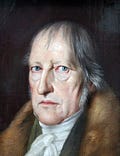Hegel & The Phenomenology of Spirit
Hegel falls into the trap of trying to communicate the incommunicable.
Spirit is an object for immediate experience ... the believing mind sees, feels, and hears divinity. Taken thus it is not imagination, not a fancy; it is actual in the believer. Consciousness in that case does not set out from its own inner life, does not start from thought, and in itself combine the thought of God with existence; rather it sets out from immediate present existence, and recognizes God in it.
Georg Wilhelm Friedrich Hegel, The Phenomenology of Spirit
I find Hegel to be just slightly less undecipherable than Heidegger; this is not an unusual opinion if you ask around philosophic circles. Hegel is sometimes (perhaps often) referred to as a mystic and with quotes such as the above, it seemed to me to be worth another try[1].
After plowing through The Phenomenology of Spirit, my opinion is that Hegel needed to heed the advice of Tom Lehrer, who said: “I feel that if a person can’t communicate, the very least he can do is to shut up.” Now, of course I mean this tongue-in-cheek, but if you for some reason look to me for advice, I suggest that you skip the slog of reading this book.
Hegel's work was a precursor to Husserl's philosophic movement (or discipline) later called Phenomenology:
The discipline of phenomenology may be defined initially as the study of structures of experience, or consciousness. Literally, phenomenology is the study of “phenomena”: appearances of things, or things as they appear in our experience, or the ways we experience things, thus the meanings things have in our experience. Phenomenology studies conscious experience as experienced from the subjective or first-person point of view.
The Stanford Encyclopedia of Philosophy: Phenomenology
Anyone who has read up to here can probably see why this field is of interest to me. Clearly, this idea has a tight connection with mysticism, and Hegel is himself often referred to as a mystic. My personal belief is that Hegel falls into the trap of trying to communicate the incommunicable. At least Wittgenstein (another native German speaker) knows when to leave it alone (“Whereof one cannot speak, thereof one must be silent”). But this is the dilemma of the mystic: as someone once pointed out, Lao Tzu said “Those who know do not speak, those who speak do not know” – but he wrote 10,000 words on the subject!
All this being said, I'm sure that if someone has the time and inclination to take a deep dive into Hegel that eventually there are important nuggets of truth. Here are a few that I found in my reading:
To know something falsely means that knowledge is not adequate to, is not on equal terms with, its substance.
This pure consciousness is at the same time simple and undifferentiated as well, just because its distinction is no distinction. Being this form of bare and simple reflection into itself, however, it is the element of belief, in which spirit has the character of positive universality, of what is inherent and essential in contrast with the self-existence of self-consciousness.
The immediateness which characterizes the presence of the essential reality within it is due to the fact that its object is essence, inner nature, i.e. pure thought.
Pure insight has, therefore, in the first instance, no content within it, because it exists for itself by negating everything in it; to belief, on the other hand, belongs the content, but without insight.
To the extent that Hegel is a forefather of phenomenology and phenomenology is a forerunner of postmodernism, one must handle Hegel like one would handle nitro glycerin: very, very carefully. Just because we accept that all we can count on is our own (necessarily subjective) experience, this is not the same as saying objective truth doesn’t exist. I don’t think that Hegel is making this claim, but his philosophic ancestors do. Caveat lector!
[1] Heidegger, I contend, was just insane and any attempt to understand him makes the reader insane as well.



